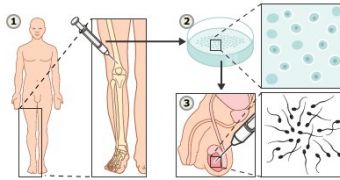F***ed to the bone could get another meaning as German researchers have successfully achieved immature sperm cells from human bone marrow stem cells.
If they can develop to sperm cells, within five years we could have a breakthrough fertility treatment.
The mixed team from the Universities of G?ttingen and M?nster and the Medical School of Hannover took stem cells that display the ability to turn into many types of tissue, from bone marrow samples achieved from male volunteers.
In the body these stem cells would develop into the different white (implied in immunity) and red cells from the blood. But the team made some of them grow up into spermatagonial cells, precursors of the sperm cells, normally located in the testes, which would normally develop into mature sperm cells.
This research achieved for the first time artificial human spermatagonial cells by employing trans-differentiation, changing stem cell types scheduled for one tissue into another type of tissue. "We're very excited about this discovery. Our next goal is to see if we can get the spermatagonial cells to progress to mature sperm in the laboratory and this should take around three to five years of experiments", says lead researcher Professor Karim Nayernia, now at the North-east England Stem Cell Institute based at the Center for Life in Newcastle upon Tyne.
"This kind of work will be very useful in helping us understand the biology of how sperm are made. That in itself may provide some insight into why things sometimes go wrong and may lead to new approaches to treating male infertility," said Dr Allan Pacey, secretary of the British Fertility Society.
Others are not so convinced by the possibilities open with the new research. "This finding is of interest but we really need to be very cautious about the interpretation", said Professor Harry Moore of the Center for Stem Cell Biology at the University of Sheffield.
"Nearly all similar observations of trans-differentiation in adult stem cells had not been confirmed when tested rigorously, as the results could be misleading. This is a fast moving field but we are still many years away from developing any therapies for infertility using such techniques. Manipulating stem cells to develop into mature sperm could cause permanent genetic changes in the sperm, making the cells unsafe to use in fertility treatments", added Moore.

 14 DAY TRIAL //
14 DAY TRIAL //